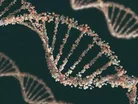[INFOGRAPHIC] Hereditary Cancer: Know Your History, Know Your Risks

Everyone has some risk of developing cancer, and in most cases the disease develops by chance. But some people are genetically predisposed to developing certain types of cancer. These people have a higher risk of developing the disease than those in the general public.
Cancer is usually caused by gene mutations that occur randomly in one or a few cells of the body. Such gene changes, called somatic mutations, may arise as a natural consequence of aging or when a cell’s DNA has been damaged. Acquired mutations are only present in some of the body’s cells, and they are not passed on from parents to their children.
[READ MORE] Why Scientists Learning How To Unboil An Egg Is Bad News For Cancer
However, in a small percentage of people with cancer, the disease is due to a different type of mutation called a hereditary mutation, or germline mutation. These mutations are usually inherited from one or both of the person's parents, and are present in nearly every cell of the body. Because hereditary mutations are present in the DNA of sperm and egg cells, they can be passed down in families.
People who carry such hereditary mutations do not necessarily get cancer, but their risk of developing the disease at some point during their lifetime is higher than average.
Is your current cancer screening personalized to your medical and family history?
[READ MORE] 4 Breakthroughs in the Fight Against Breast Cancer
Genetic counseling involves a discussion of your personal or family history of cancer. It is typically recommended for individuals or families with multiple cases of cancer diagnosed at unusually young ages.
Genetic counselors will tell you about the scientific concepts that relate to genetic testing and help you decide what genetic tests, if any, might be useful for you.
Genetic testing involves a simple blood test and may be used to obtain a more precise estimate of your cancer risk. In some cases, genetic testing can be done on stored tissue samples from deceased relatives.
Genetic testing is not required for a cancer risk assessment. However, it may in some cases help you and your physician make important decisions about your medical care.

Follow us on Twitter (@HealthcareGlbl) and like us on Facebook!
- Manufacturers Unite in the Battle Against Breast CancerMedical Devices & Pharma
- Thirona’s AI Tech is Creating Individualised Patient CareTechnology & AI
- HPV Vaccine 'Protects Males from Cancers' - Global ReportMedical Devices & Pharma
- Hologic: How Can Technology be Harnessed to Combat Cancer?Technology & AI



